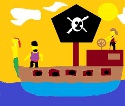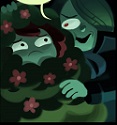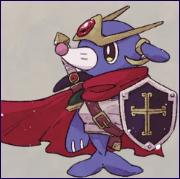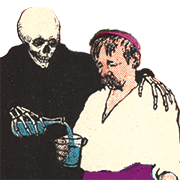|
Osmosisch posted:Much cleaner, looks good. I'd tone down the border a little but otherwise fine. Thanks! I made the border a little thick because I generally chop up the cards with a big paper cutter in huge chunks at once because I'm lazy, and so the thick borders help avoid making it obvious when I gently caress up  Anniversary posted:Agreed. I really like the iteration you've landed on CodfishCartographer! It's always frustrating losing design space, but giving it up to make ones design more intuitive usually seems worth it. Yup! I'm still working hard on it, I haven't really posted about it in a while since it's been undergoing pretty big changes pretty quickly, and by the time I would take the effort to get a print n play version ready I'd already have found and addressed problems with it, haha. I think I'm growing close-ish to a steady version though, I'm hoping to start pitching it to some producers later this year. I had a few people interested a while ago, but honestly the game was real bad back then and one fell through, while the other is waiting to see whenever I have it ready. The game has evolved to be purely cooperative, no more semi-coop stuff. Players start by choosing two small decks, 6 cards each. One is your weapon and its abilities, and the other is a magical element and the spells it casts. For example, You can have Water Katana, or Fire Katana, or Fire Staff, or Wind Staff, etc. Players place their game pieces around the Behemoth, just like in older versions, but now there are also villagers (represented by cards) in locations around the Behemoth - if they get hit by a Behemoth attack they die, and if all villagers die the players lose. Players can bodyblock attacks for the villagers though, and can choose to get assistance from a villager at their location. This gives them a one-time bonus (health recovery, drawing cards, etc) but also gives them a dice of the same color as the villager. Players start with 4 lovely grey dice, and the cards you play determine how many dice you get to roll that turn. As villagers help you, you can swap the lovely grey dice for dice with more focus - one for damage, one for recovery, one for boosting cards, etc. So as you play, you build a custom dice pool that (combined with your two decks of cards) determine what you're good or bad at. Deal enough damage and you win, all villagers or players die and then you lose.
|
|
|
|

|
| # ? May 15, 2024 15:45 |
|
Oh man, that villagers idea is really, really clever. Good luck! Yeah, I've gotten this before and its good advice. And the color distinction is an additional reference, all Hidden cards both say that they're Hidden and have the alternate border, so hopefully that doesn't trigger your righteous ire? 
|
|
|
|
al-azad posted:If you enjoy CAH I think an important question to ask yourself is "What do I like about this experience? The game itself or the people I'm playing with?" I'm not sure what this is replying to. Was this to me?
|
|
|
|
Foolster41 posted:I'm not sure what this is replying to. Was this to me? I suspect it was a case of posting in the wrong thread?
|
|
|
Anniversary posted:I suspect it was a case of posting in the wrong thread? Yeah agreed; there's a "CaH is trash" vs "But we had fun with it" argument going on right now in the main boardgames thread.
|
|
|
|
|
Ah. Machine of Death has a sort of CaH style to it, so I thought it was related to that, but that makes sense.
|
|
|
|
Although it does serve a valuable lesson that just because people have fun with a game, doesn't mean it's a "good" game.  Which will haunt you until the end of your days wondering if the people playtesting your game really had fun with it or not Which will haunt you until the end of your days wondering if the people playtesting your game really had fun with it or not
|
|
|
|
Anniversary posted:I suspect it was a case of posting in the wrong thread? This is what I get for having multiple screens open! CodfishCartographer posted:Although it does serve a valuable lesson that just because people have fun with a game, doesn't mean it's a "good" game. Yeah, that's what I meant! A lot of games try to create a fun environment but it's not the game that's interesting, it's the people you're hanging with.
|
|
|
|
So I had the idea of one of the scenarios being to solve a mystery. I like the idea the players play item cards as the clues, and basically, have to make up the clues they find and what the mystery was, and the solution, and if the clues and solution make sense to everyone involved, they succeed. But I'm not exactly sure how this works, because it feels too unguided and abstract. I feel like there's at least one mystery type game where it's more abstract like this, (you don't solve a written answer, like the 21b Baker St.), but it's more points towards the solution. Is there a game like this? Ideas on how this could work?
|
|
|
|
Foolster41 posted:So I had the idea of one of the scenarios being to solve a mystery. I like the idea the players play item cards as the clues, and basically, have to make up the clues they find and what the mystery was, and the solution, and if the clues and solution make sense to everyone involved, they succeed. But I'm not exactly sure how this works, because it feels too unguided and abstract. Uhh, Mysterium maybe? There are some storytelling games that are very open ended too. The problem is if it's too open-ended, players that aren't creative enough get lazy with it and it falls apart. Obviously any storytelling game can suffer from that, but you can alleviate it with decent design. I'd say make sure your prompts guide the players in directions, rather than giving them total freedom. "You find an object that sends a chill down your spine, and may spell doom for your journey. What is it? Do you show the others?" is much better for facilitating storytelling than "You find a skull" or whatever. I'm not totally sure how you can shift this into a mystery solving game, but I'm sure it's possible. Maybe the players establish a mystery they want to solve from the get-go, then the different cards they find lead them in different directions and state boons / trials they encounter. You could probably prompt for short storytelling sessions after these cards as well, so the players can do most of the heavy lifting story-wise.
|
|
|
|
Mysterium is a good game, but it's the players leading towards an established hidden answer, rather than having to come up with a plausible good answer. You're right that it is too open-ended. I think I need to establish a specific crime (Theft) at least. What I have so far is: quote:Mysterious Theft (Draw a person and place card) It still feels a bit open-ended though maybe.
|
|
|
|
The mystery is made up of a collection of cards drawn at random, such as location, time, physical evidence (body, missing item etc), and a few circumstantial things (bloodstains, thunderstorm, footprints etc). The cards instruct you to build a deck for drawing from during play out of certain sub decks. So like, if the location is Mansion on Hill, add the Mansion cards to deck with poo poo like hidden passages and haunted poo poo, Thunderstorm add like power outages and lighting strikes etc
|
|
|
CodfishCartographer posted:Thanks! I made the border a little thick because I generally chop up the cards with a big paper cutter in huge chunks at once because I'm lazy, and so the thick borders help avoid making it obvious when I gently caress up I meant around the phase abilities, but sure once you're used to thick you don't go back  If you want, once you're ready to have foreigners knock your game about i can try it in my test /design group. If anyone reading wants to test my cooperative monster fighting game drop me an email at my username @gmail. I've got one monster and a set of zookeepers I'm pretty done with and I'd like to get fresh eyes on it.
|
|
|
|
|
Sandwich Anarchist posted:The mystery is made up of a collection of cards drawn at random, such as location, time, physical evidence (body, missing item etc), and a few circumstantial things (bloodstains, thunderstorm, footprints etc). Is this a suggestion on how I could do the mystery in my game, or a description of an existing game? It's interesting but feels a bit too in-depth (the deck building thing). and requiring cards that would be too specialized to this one scenario (secret passages, bloodstains). I'm trying to do a sort of a simulated mystery but within the mechanics/materials, I have for the game.
|
|
|
|
Foolster41 posted:Is this a suggestion on how I could do the mystery in my game, or a description of an existing game? Was a suggestion, just an idea. I've found that in most things, throwing things against the wall to see if they stick results in cool poo poo happening.
|
|
|
|
yeah, that's true. E: I had an alternate idea, though it's more mechanical than storytelling. Also, maybe too wordy quote:Players choose to draw and place face up an item card (representing a clue found). If you do, draw a motive card face up. So players can get more clues, and have a better chance of solving the crime, but taking more time means the criminal is more likely to get away, so it has a sort of press your luck mechanic to it. Make sense? Wording too confusing? Foolster41 fucked around with this message at 22:27 on Apr 15, 2018 |
|
|
|
In that situation, how do you "solve" the case using the clues?
|
|
|
|
I guess I didn't define what an action check does. You roll a D10, and the goal number is # of players + 3. And you add each item card to your roll. So with 3 players, and each playing a card that's 80% chance of solving it. If they have 4 cards between them that's 90% odds. (I might make it so you can't go over 90% chance). So in this version, what's on the cards doesn't particularly matter Necciserily. (though I guess it'd be more interesting if they did) E: The problem I'm having now is with balancing how much each of the resources the players have wears down. Usually, in games like this, there's a deck where bad things happen, and occasionally a more bad thing happens shuffled throughout (outbreaks, sun beats down). I don't want to add yet another deck to this game, so I've been trying to bake it into the scenario deck, but I'm not sure it works, or if I can really balance it to an interesting "flow". Each player has health, morale, and items which are chipped away in day scenarios At evening, they can choose to either replenish items or gain progress towards winning. (I want to make it so items are needed to not die/ lose hope, but right now it feels like progress is the obvious choice). I feel like this is necessary because not every scenario gives the chance to gain progress, and you're not necessarily going to see every scenario every game. At night item cards are spent to prevent further chipping away of health and morale. Shuffled in the day scenarios also are cards that make the beast creep closer to the party. I guess the thing is unlike games like Pandemic and Forbidden Dessert, there's no smaller deck that's gone through a few times throughout the game, so balancing when the "beast creeps forward" and counting on not every scenario being hit is tricky. I'm hoping test playing maybe will help me fix this, but right now it just doesn't feel like the right mix at all. Foolster41 fucked around with this message at 05:36 on Apr 16, 2018 |
|
|
|
Welp, that was pretty short lived. License holder is "not currently considering any game adaptations." Oh, well.
|
|
|
|
So the other day I was watching this video on Mall Madness, the old 90s board game: https://www.youtube.com/watch?v=OLLArcx60bE And it did some neat stuff that I thought was funny, particularly how some games nowadays use apps for randomized events, and this game was doing something similar (but much more primitive) way back in the day. Just a little hint of things to come. In the video I posted, the reviewer mentions how the “Credit cards” you have aren’t actually credit cards and don’t hold any information, they’re just cardboard, but that DID make me wish there was some game that DID have a credit card sort of thing. You could easily make a game about trying to manage your money, but not knowing exactly how much you have left. There are plenty of games where you don’t know opponent’s resources, but one where you don’t know your own could be cool too. To protect from people just doing easy math in their heads, you could try to complicate stuff; This item costs 34.50 base, but is 15% off! And it’s your third purchase here, so you get back 12% of all the money you spent at this store! Or something. I think there could be a fun game of only having a vague idea of how much money you have, but not knowing the precise amount. This sort of thing would be easy enough to track on an app, and/or a chip on a fake credit card and one on the board. Would be rough on the people who fall for “oh, this is only 5 dollars!” microtransaction sorts of things as well, which could be hilarious. CodfishCartographer fucked around with this message at 17:52 on Apr 18, 2018 |
|
|
|
There was a version of monopoly that uses credit cards. You'd think the updated version of this game would use a credit card system that tracks the money, instead of the convoluted cardboard cards and cash system. Nope. Also, Mall Madness looks like it's basically just random with very little in terms of choice (if any at all, "run as fast as you can to clearances/sales) I'm trying to figure out a clear way to represent choices for the scenarios in Lost in the Woods.  Do I need the lines to represent the choice, or is it clear enough without it? Is there another way I could lay this out? Right now I have the cards 3'x5', which I think would be a bit clunky to shuffle, but I'm afraid of it being too hard to read if it's too small (3.5'x2.5').
|
|
|
|
Foolster41 posted:There was a version of monopoly that uses credit cards. You'd think the updated version of this game would use a credit card system that tracks the money, instead of the convoluted cardboard cards and cash system. Nope. Huh, I'd never heard of that version! I’ll have to check it out for ideas. I did see a preview recently for “Monopoly: Cheaters Edition” which I thought was clever. As far as I can tell, it’s a version where you’re encouraged to cheat - steal money from the bank, steal property cards, sneak houses onto properties, move the other players’ pieces, etc. The caveat is that if another player catches you, then you get punished. It’s kind of a neat idea, more or less taking the magic card Cheatyface to its logical extreme. I do like seeing mainstream board games pushing their designs into other types of experiences though, especially since then you can play with rules you can trust the public hivemind to already know. Foolster41 posted:Also, Mall Madness looks like it's basically just random with very little in terms of choice (if any at all, "run as fast as you can to clearances/sales) Oh yeah definitely, I wasn’t particularly saying it was a good game or anything, just that it was surprisingly ahead of its time in some regards. Foolster41 posted:I'm trying to figure out a clear way to represent choices for the scenarios in Lost in the Woods. Will all your cards be set up like this? Aka “Do Thing. If X: -result a -result b. If Y: -result a -result b”? If so, you can divvy up the card into two separate partitions or something - a “succeed” side and a “fail” side or whatever, and list the results in those two boxes. Can have the top list out the type of check it is, or whatever. CodfishCartographer fucked around with this message at 18:50 on Apr 18, 2018 |
|
|
|
Most of them are. That's a good point. Thanks. So something more like this?  I suppose if I wanted multiple branches in a single card, this would be tricky to do clearly though this way. Though I'm not sure I want to (It had it, for example, you had a chance to not lose health with an "action check" but I was afraid that was making too much going on in scenarios. I wanted "on rejection" conditions too on some cards, which maybe could just be a box on the bottom, but I'm afraid of it being unclear how to read the card. E: Also, the monopoly cheaters version, that's how I used to play sometimes growing up, we agreed you were allowed to try to cheat, as long as you don't get caught. I'm not sure what you would need to add for a separate edition for that though. Foolster41 fucked around with this message at 18:54 on Apr 18, 2018 |
|
|
|
I’ve been lazily batting at an idea for a game idea for a while, wanted to workshop it before prototyping while I’m drunk and don’t know better. So take a typical “I’ll trade you three wheat for one wool” euro yeah? Something along the lines of Sidereal Confluence where cubes become cubes become victory points. But instead of colored cubes the trade goods are represented by weighted tokens. So Wheat tokens would be 13 grams, Wool tokens would be 2 grams, etc. probably five or six cause those are the magic numbers apparently. And rather than everyone going around the table demanding “wood for sheep?!” there’s a literal balance scale included that you put the goods you want to give on one end and the other player puts goods they’ll give on the other end. If the scale balances then the trade is “fair”. Otherwise the player with the lighter side can throw coins on the scale until the offering player accepts. Been playing around with themes. A Mansa Musa theme appeals to me but I feel that I’d have to steer the game towards the effects & consequences of inflation rather than pure processing and trade. Plus I’m uncertain how you’d assemble a scale with the game and achieve the kind of tolerances you’d need for fair trading (maybe hang-weights, to make multiplication easier?). Would appreciate any thoughts and opinions, the previous game design patron fell through so I am working w/o constraints.
|
|
|
|
|
I swear your Honor, the pocket scale was for my boardgame! Honest!
|
|
|
|
Triskelli posted:I’ve been lazily batting at an idea for a game idea for a while, wanted to workshop it before prototyping while I’m drunk and don’t know better. This sounds like an overly complicated gimmick that doesn’t add anything interesting to gameplay. It’s just a fiddly method of assigning a value to something.
|
|
|
|
Crackbone posted:This sounds like an overly complicated gimmick that doesn’t add anything interesting to gameplay. I think it's an interesting space to play in, though (manufacturing concerns notwithstanding). If your trades were hidden lots, there'd be potential for deception. "See, look! My bag weighs 12g, just like you want." "Yeah, but it feels like there's more in the bag than just the 4-gram gold blocks I asked for..." It'd still be pretty fiddly, don't get me wrong, but it's interesting to explore an aspect of the physicality of games that's rarely seen.
|
|
|
|
Crackbone posted:This sounds like an overly complicated gimmick that doesn’t add anything interesting to gameplay. Also like, value changes over the course of games. Like even if Wood is super common and Sheep are rare (and weighted accordingly), it's entirely possible a player simply does not have any Wood and needs it but now no one will trade with them because the game says "nope sorry the Sheep you're trying to trade away is worth at least 4 Wood due to their respective weights". And this is a very basic example but the point is that in the vast majority of games resources will have some amount of value fluctuation based on player strategy at a minimum, and that's not counting for things like resources coming from dice rolls but the die just aren't following the assumed probability sometimes.
|
|
|
|
It makes me think of something like Sherif of Notingham, with the mechanic of deception, but making trades and figuring it out by weight whether or not you're getting cheated. That could be really neat. It might be expensive to make, though Eurphoria had a mix of wood and metal pieces, so it seems possible.
|
|
|
|
Foolster41 posted:It makes me think of something like Sherif of Notingham, with the mechanic of deception, but making trades and figuring it out by weight whether or not you're getting cheated. That could be really neat. Something like this maybe: If players have a chance to feel both bags in a proposed trade at once, it both kills the magic, because they'll almost always reject something that feels lighter than what they're giving, and extends the game. You probably need a structure for ordering trades and limiting the number of "hand weighings" to create imperfect information. Say the active player puts what they want to trade away into their cloth bag and passes it around the table. Each player gets a chance (either a very brief countdown or a set 1 or 2 jostlings of the bag in their hand) to get a feel for it before passing it to the next player. Once a player has felt the weight of the offer, they can choose to slip whatever tokens of theirs that they want to trade for the offer into their bag. The active player will get a chance to feel the weight of each proposed offer once, in the set order, and then maybe can feel the weight of their own offer one more time. Then they have to accept 1 specific offer or reject all offers, triggering some other effect. You can throw in some powers or special resources that let players break the rules by getting extra hand weighings or look at tokens on offer, etc. As said, it would be a bit of a pricey gimmick, but you could build a nice bluffing game around it.
|
|
|
|
Or just print the assigned value of the good on the cardboard marker? I mean in all seriousness I can’t fathom what this would offer in gameplay other than skill at guessing the weight of things. I kind of mean to be harsh here because recognizing gimmicks vs. gameplay is a big part of good design.
|
|
|
|
It could maybe work?? If you're clever enough? I think there could be some worth to like, needing to feel the weight of two bags and decide if you want to make a trade or not. You could actually make each of the recourses feel similar but slightly different so you could try to fool someone. I feel like the scale is the least interesting part of the idea, whereas there could be some value to using your sense of touch as the gameplay. It's something unique to board games, and not many games take advantage of it.
|
|
|
|
Everyone would just cheat everyone at every opportunity, which would lead to either nobody trading, or everyone expecting to be cheated, removing the entire point of it being a risk aka bad gameplay
|
|
|
|
I mean you could probably design to make people want to tell the truth at times, but get to a certain point and you're just making Sheriff of Nottingham again so you'd probably need to go in a different direction. I think probably anything is possible in the realm of game design, but some things are definitely harder to make work than others.
|
|
|
|
I have been kicking around this idea for a board game where the players function as the arms dealers for a bunch of NPCs duking it out in a Risk-style conflict. I'm waffling on the complexity, but the idea would be that players are competing to obtain cheap resources from the NPC factions, use those resources to build weapons of war and sell them at a profit, and end up with the most money at the end of the game. I'm wondering if anyone knows of an existing Risk-style game that might have NPC movement logic that I could take a look at? It seems like I'll need some sort of movement flowchart, and I'm not even sure if that will be possible without having the "NPC movement" section of each turn take forever.
|
|
|
|
You could maybe have players control the NPC factions? Something like on your turn, you can control any number of one faction’s units? Players could then attempt to sabotage by moving the faction that the winning player has invested most in away from conflict and other stuff that could benefit them.
|
|
|
|
Baronash posted:I have been kicking around this idea for a board game where the players function as the arms dealers for a bunch of NPCs duking it out in a Risk-style conflict. I'm waffling on the complexity, but the idea would be that players are competing to obtain cheap resources from the NPC factions, use those resources to build weapons of war and sell them at a profit, and end up with the most money at the end of the game. This sounds pretty close to Imperial or Imperial 2030 with resource, order fulfillment, and NPC systems added in, which might complicate gameplay and get in the way more than they help, unless you're aiming for a specific, different player experience. For some NPC logic in a complex territorial war game, maybe look at the various COIN series games? Cube Libre, Fire in the Lake, Labyrinth: The War on Terror, etc. Haven't played them, but I don't think they have rules for moving armies around. Instead, the space/territory that a non-player faction acts on is either determined by the events happening that turn or through random dice rolls.
|
|
|
|
CodfishCartographer posted:You could maybe have players control the NPC factions? Something like on your turn, you can control any number of one faction’s units? Players could then attempt to sabotage by moving the faction that the winning player has invested most in away from conflict and other stuff that could benefit them. That might be an easier way to go, but I'm not sure that's where I want the strategy to be. I'm thinking that the board would be an arrangement of hex tiles representing different areas with a particular resource (iron, copper, gunpowder?, and ?). Each faction would have a randomly placed capital, and would be warring for control of additional tiles. I'm thinking that different unit types combined with some basic logic might accomplish somewhat similar to what I'm aiming for. Each unit could start at the capital, and move out according to a different rule: Type 1: Pick the resource we have the least of, find the nearest (to the capital) enemy tile with that resource, and take the quickest path through friendly territory to it. If you are the only unit on a tile, stay put. Type 2: Maybe the same logic, but a stronger unit? Type 3 (Defense): Find the nearest friendly tile without a type 3 unit on it, and move to that tile. If all friendly tiles have a type 3 unit, add a second according to the same rule. Those feel fairly simple, but I can't tell if I'm kidding myself. The intent is that the NPC factions would expand out somewhat evenly, mobile offensive units would have the tendency to group up, and larger factions get to dig in a little bit with defensive units, as long as they can find a player willing to sell to them. Baronash fucked around with this message at 03:29 on Apr 26, 2018 |
|
|
|
Baronash posted:That might be an easier way to go, but I'm not sure that's where I want the strategy to be. Those rules would probably work, but the problem is making them fun. Players needing to check a list of rules and scan the board to see if they’re applicable just isn’t that interesting or engaging in a board game. Could work great for a video game where all that stuff is automated, but on a tabletop it can really drag down the game since it’s more or less just busywork. I could maybe see just going by 1 simple rule with some tiebreaker rules thrown in, the resource one would proabbly work well enough. You could probably even simplify it more with something like “Move to any neighboring tile that contains the resource we have the least of” and leave it at that, even if it means that army is moving to a terrible position or fights a fight it has no chance of winning.
|
|
|
|

|
| # ? May 15, 2024 15:45 |
|
CodfishCartographer posted:You could probably even simplify it more with something like “Move to any neighboring tile that contains the resource we have the least of” and leave it at that, even if it means that army is moving to a terrible position or fights a fight it has no chance of winning. Honestly I think this would be more of a pro than a con. Playing competent AIs off each other isn't very interesting, allowing the AIs to be exploited makes the game a lot more dynamic.
|
|
|






























